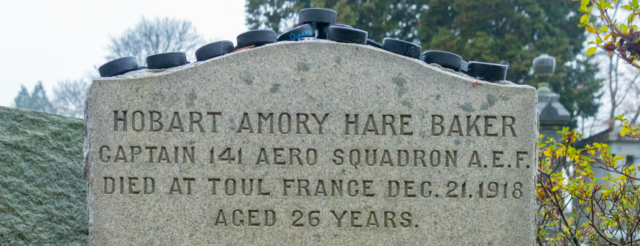PHILADELPHIA’S HOBEY BAKER DIED 100 YEARS AGO IN FRANCE.
By Frank Fitzpatrick
A HOCKEY AND WAR HERO’S LEGACY LIVES
Posted/Printed on The Inquirer Philly.com
A bugler played Taps, an honor guard stood at attention, and a light rain dropped softly, like tears rolling down cheeks, onto a crowd gathered Saturday morning at Hobey Baker’s grave in West Laurel Hill Cemetery.
The weather matched the solemn tone of the event commemorating the 100th anniversary of the death of the World War I hero from Philadelphia, who is a member of both the hockey and college football halls of fame.
Hobart Amory Hare Baker enlisted in France’s Lafayette Escadrille in 1917 and was awarded that nation’s Croix de Guerre for his flying feats. He died during a test flight on Dec. 21, 1918. Buried in France, his body was returned to the United States in 1921 and interred at the cemetery in Bala Cynwyd.
Saturday’s ceremony came about after Nancy Goldenberg, the cemetery’s president and CEO, discovered Baker was buried on a hill at the rear of the vast property.
“When I found out, I said, ‘Oh, that’s great. Who is Hobey Baker?'” she said. “But, the more I read about Hobey, the more my fascination grew. It wasn’t just the story of his life and tragic death, but his remarkable character as a human being. His resilience, passion, patriotism, and humility.”
A local Ameri Legion official laid a wreath at Baker’s simple headstone, which was topped and surrounded by hockey pucks that visitors still leave there. Relatives attended, as did officials of the foundation that administers the Hobey Baker Award, presented annually to college hockey’s outstanding player; an ROTC honor guard from Princeton, his alma mater; and Princeton’s and Penn State’s hockey coaches, whose teams faced off Saturday night at the Wells Fargo Center.
“It’s always fun to watch teams come into Princeton’s Hobey Baker [Memorial] Rink,” said Guy Gadowsky, who coached the Tigers before taking the same job at Penn State. “Whether ifs a national team, a college team, or a peewee team, they all very quickly congregate over at the Hobey Baker memorial. They look at his skates. They look at the award. They look at the pictures. His legend is very much alive.”
Born into a prominent Philadelphia family in 1892, Baker became a national sensation at Princeton. The captain and star of the football and hockey teams, he was a campus demigod. One of those who idolized him was F. Scott Fitzgerald, who would use Baker as a template for several of his literary heroes.
In football, Baker, whom Philadelphia sportswriters dubbed “the blond Adonis of the gridiron,” set scoring records that stood for half a century. America’s first hockey superstar, he refused to play professionally. But his games with the St Nicholas Hockey Club’s amateur team were major New York City sporting events, and NHL legend Lester Patrick once said that Baker could have been a professional superstar.
In 1981, the NCAA honored him by presenting the Hobey Baker Award to the year’s outstanding college player. In 2014, South Jersey’s Johnny Gaudreau, now on the Calgary Flames, won it.
Princeton coach Ron Fogarty said: “As a player growing up in Ontario, I wanted one day to have the opportunity to be consider for the Hobey Baker Award. I didn’t know anything else about college hockey. Now, at Princeton, I see that Hobey’s legacy is far greater than the award. Our guys have pictures of Hobey Baker in their dorm rooms. They talk about Hobey.”
After Princeton, Baker went to work on Wall Street. He was an early and enthusiastic pilot, and, in 1917, he enlisted in the famed French unit. When the United States entered the war, Baker transferred to its 103rd Aero Squadron.
“He died in flight doing something he loved,” said Christo Morse, his great-great grandnephew, who was accompanied by his 4-year-old daughter, Hobey. ”He was always in flight – over the ice, across the field, through the air. He was a fierce competitor who carried himself with elegance and grace.”
Later, Morse posed for photos in front of the headstone, which was inscribed with a poem by an anonymous author.
“I think some day you may have flown too high,
So that immortals saw you and were glad,
Watching the beauty of your spirit’s flame,
Until they loved and called you, and you came.”
”He’s like some winged angel,” said Morse, a movie producer who lives in Brooklyn. “It’s
sometime hard to imagine he really lived.”
(Reprinted from Hobey Baker Web Page)







